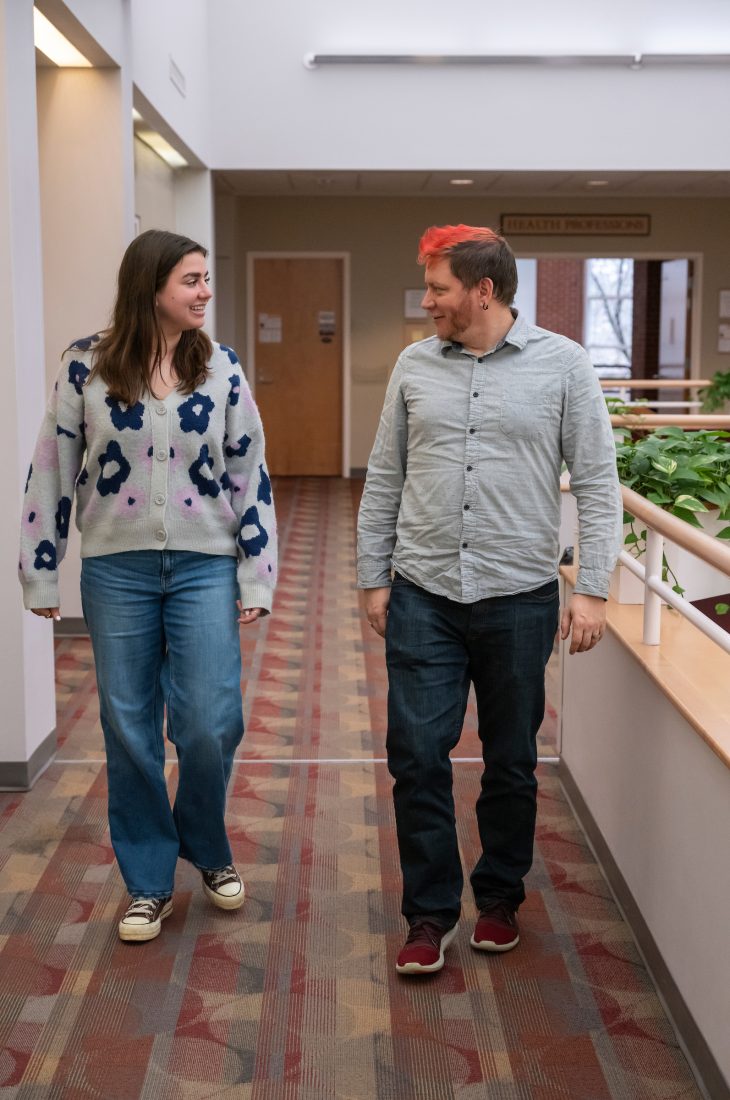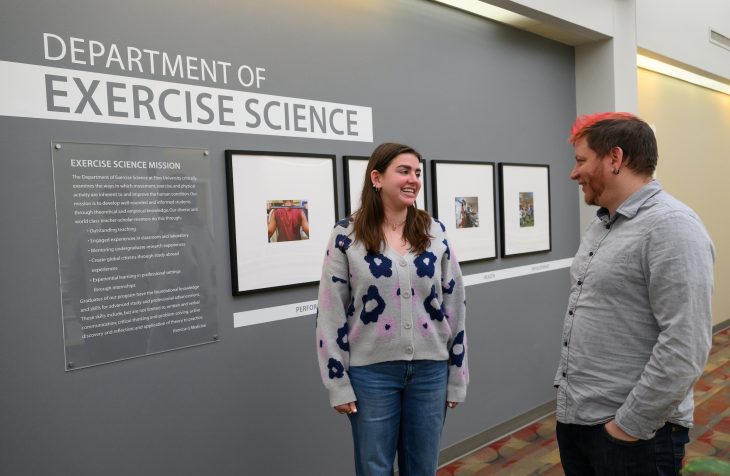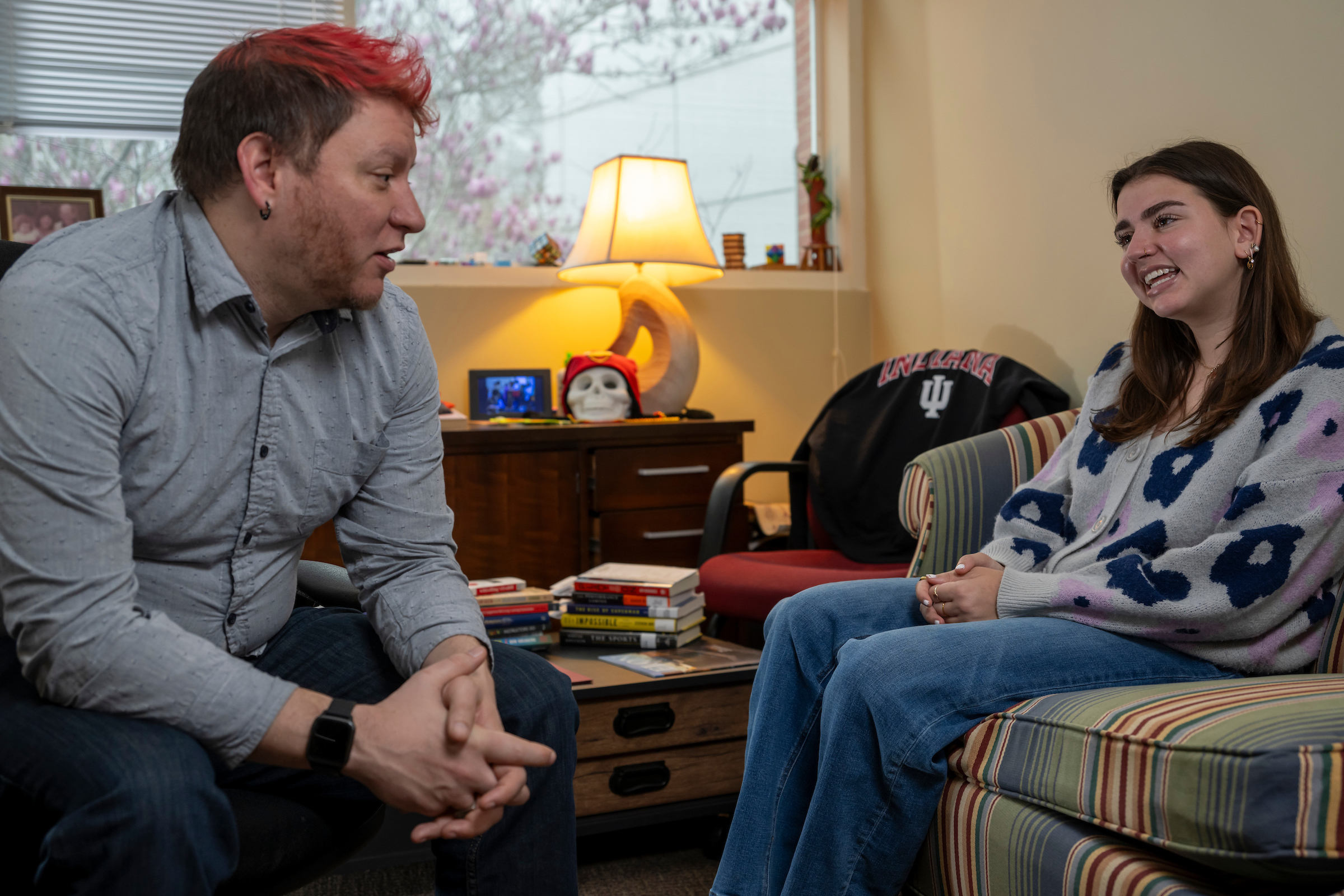With her mentor, Associate Professor Matt Wittstein, the Lumen Scholar and exercise science major is exploring the psychological and physical effects for different clinical populations from learning to play the instrument.
As a Lumen Scholar, Roxy Geballe ’24 has drawn from her personal experiences to explore how playing a musical instrument can have an impact far beyond musical enjoyment.
Geballe is majoring in exercise science and minoring in psychology, with plans to pursue a graduate degree in occupational therapy after graduating from Elon. As a Lumen Scholar, Geballe has been able to investigate the physical and psychological effects of learning to play the piano for different clinical populations, with a particular focus on those with arthritis and attention deficit hyperactivity disorder.
Geballe has been able to pursue this in-depth research with Associate Professor of Exercise Science Matt Wittstein as her mentor through Elon’s Lumen Prize program. The Lumen Prize is Elon’s most prestigious award for undergraduate research and awards scholars a $20,000 scholarship to support a chosen research project and allows the scholar to work closely with a faculty mentor on that project for two years. Each year, 15 rising juniors are named Lumen Scholars and conduct research that often produces conference presentations and publications.

Geballe admits that her research focus may initially seem random, but explains that it’s rooted in her own experience. “I do have arthritis, so I have that personal stake in the situation,” Geballe said. “I also play a few instruments myself.”
Since Geballe has been playing piano for years, this project has opened the question of music’s impact on not just the health of others, but herself as well. Her research question has evolved since being selected for the prize in 2022, when it was solely focused on those with arthritis. Beginning the search for participants was an initial challenge Geballe faced, especially given the younger demographic of a college campus.
“I ended up having participants from the age of 20 to 87. Some students, some faculty, and then I went over to Twin Lakes retirement facility,” Geballe said. “So that definitely took some time and energy to get oriented.”
Throughout her research, Geballe has been able to lean upon Wittstein as her mentor for support. “I found the piano sessions we did with participants very daunting at first,” Geballe explained. “But he let me take the reins with them. He would go to a few, but not all of them, and was able to encourage me and make sure I knew I could do it.”
Wittstein attested to Geballe’s growth and her growing independence throughout this project as it progressed. “She was always incredibly prepared, thoroughly looking through the literature, being playful and creative yet still exploring the research idea, which is one characteristic I really like to see in students,” Wittstein explained about Geballe’s process from the initial stages. “They’re not necessarily focused on the exact thing they’re going to do, but how they’re going to adapt that idea.”

Together, Geballe and Wittstein broadened the project to focus on other populations besides those with arthritis, which helped the research to flourish. They began their work with the second cohort of ADHD participants.
“I’m excited to take this sort of framework to future students,” Wittstein explained. “If a student comes in looking for what to research, I can show them this worked fairly well, and I think we can apply it to different populations.”
With the research coming to a close soon and graduation nearing, Geballe plans on attending the University of Wisconsin in Madison in the fall to pursue her doctorate of occupational therapy degree.
“My project was helpful in applying since it mirrors a lot of values of occupational therapy,” Geballe said. “So a lot of the tools I used to measure the quantitative aspects with the arthritis population like grip strength and range of motion are the same tools an occupational therapist would use, which was a nice full circle moment.”
As a mentor, Wittstein is proud of all Roxy has accomplished, and more importantly what she’s made of the research. “It’s not that she got the award and just did the project, but she adapted. She changed things,” Wittstein explained. “Seeing all of that is the most rewarding.”



